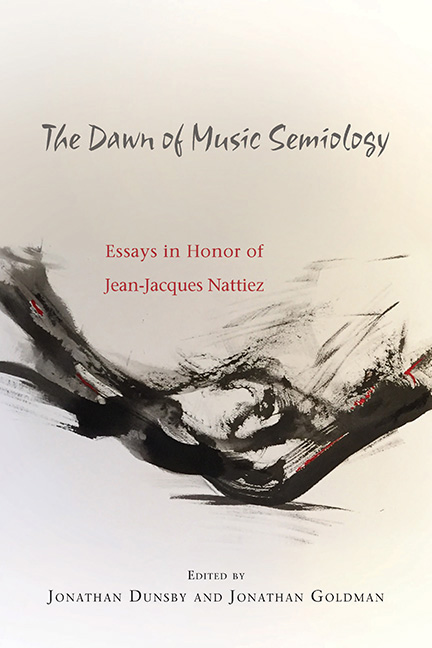Book contents
- Frontmatter
- Contents
- Foreword: About Jean-Jacques Nattiez
- Acknowledgments
- Introduction
- Part One Metaconsiderations
- 1 Music and Gesture
- 2 Music Semiology in the Mind of the Musician
- 3 Against Ethnotheory
- Part Two Poietic Channels
- Part Three Esthesic Excursions
- Selected Bibliography of Works by Jean-Jacques Nattiez
- List of Contributors
- Index
- Tabula Gratulatoria
2 - Music Semiology in the Mind of the Musician
from Part One - Metaconsiderations
Published online by Cambridge University Press: 26 April 2018
- Frontmatter
- Contents
- Foreword: About Jean-Jacques Nattiez
- Acknowledgments
- Introduction
- Part One Metaconsiderations
- 1 Music and Gesture
- 2 Music Semiology in the Mind of the Musician
- 3 Against Ethnotheory
- Part Two Poietic Channels
- Part Three Esthesic Excursions
- Selected Bibliography of Works by Jean-Jacques Nattiez
- List of Contributors
- Index
- Tabula Gratulatoria
Summary
Many of the present author's music analyses have been largely inspired by the work of Jean-Jacques Nattiez: from early examples, such as what claimed to be the first Schenkerian “projection of the paradigmatic axis onto the syntagmatic axis”; to more recent semantic studies of vocality which claim to “keep clearly in mind … the ‘tripartition.’” For many scholars, however, the lure of music semiology has stemmed as much from its epistemological clarity as from the windows it opens into interpretation, and this study will focus on the former, though not without implications for the latter. A fact of human life that semiology seems to be particularly good at exposing is how special the musical mind is, compared with the mind when verbalizing, cogitating, or doing anything other than being musical. One might have expected music psychology to have embraced music semiology. Nattiez, however, has emphasized that music semiology is not a science of communication. He has long objected to conventional notions of “communication” as a model of musical purpose and effect. Nevertheless, it has always been integral to Nattiez's mode of thought that music semiology is certainly the “science” of something. The forensic qualities of his epistemology and argumentation may not always have been embraced explicitly by anglophone musicology, but musicology has often resonated unwittingly with the aims of music semiology, hence the profound influence of Nattiez's research, often where it may not be specifically acknowledged or even recognized. In music psychology or music cognition—and the perception of music is central to Nattiez's whole endeavor while working, as it were, outside the mainstream of those disciplines—it is not so easy to discern the imprint of semiology. This gives pause for thought.
Just what a “science” is in the first place is a question almost too obvious and complex to be asked, but it must be a matter of continual fascination that we humans, knowing nothing other than our own minds (in Cartesian terms, at least), are perpetually driven to believe that there is a world outside ourselves. Since we think we are observing and experiencing something, not merely creating it in our individual imaginations, it is, as everyone knows, music above all the arts which in its essentially fugitive nature can touch us most deeply.
- Type
- Chapter
- Information
- The Dawn of Music SemiologyEssays in Honor of Jean-Jacques Nattiez, pp. 23 - 37Publisher: Boydell & BrewerPrint publication year: 2017

